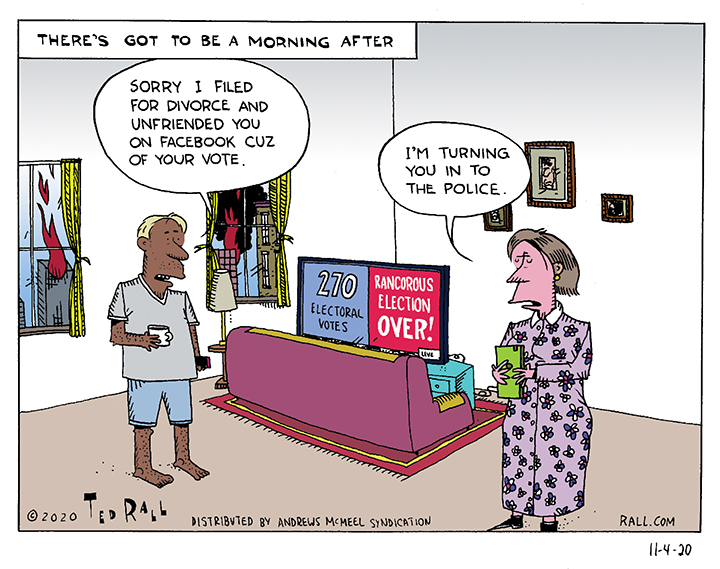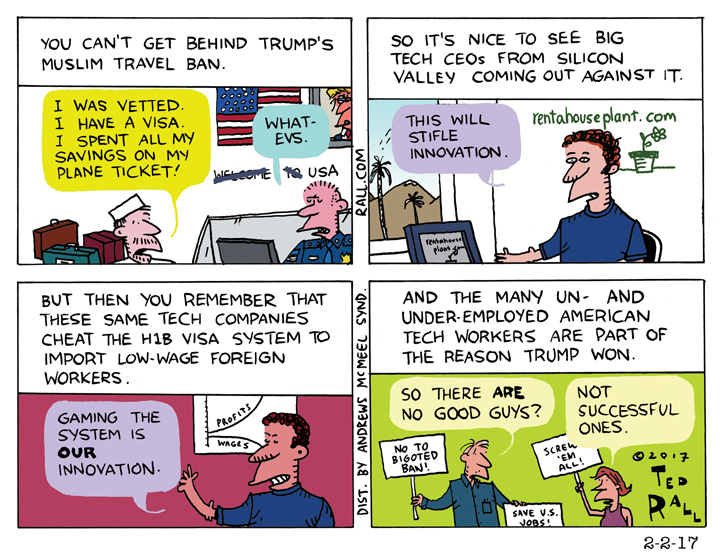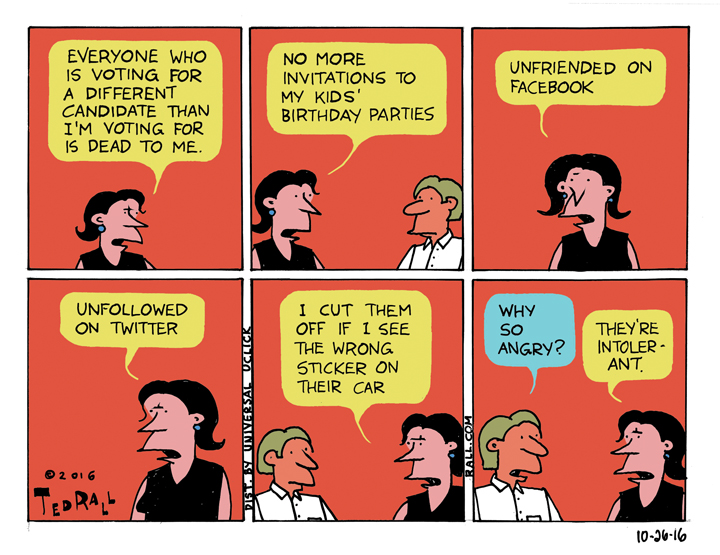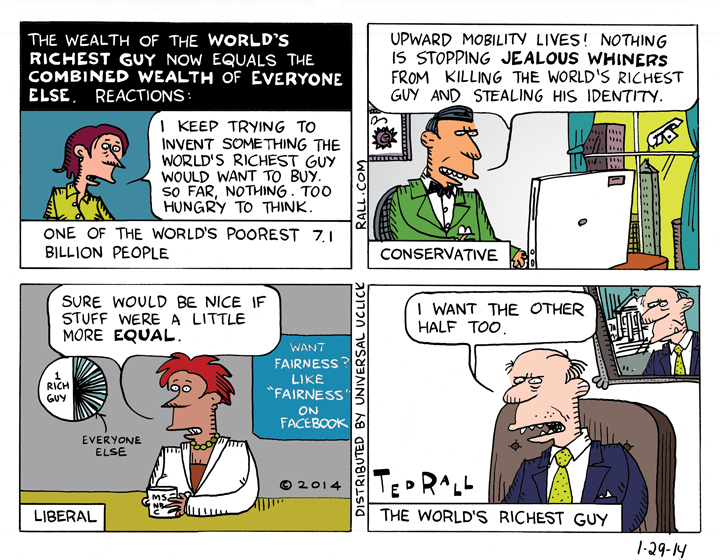After one of the most contentious presidential campaigns in memory, Americans are waking up find friendships gone, alliances shattered and bridges burned.
SYNDICATED COLUMN: Don’t Fall for the First Amendment = Free Speech Trick

Like climate change, this is one of those problems I keep expecting people to wise up about but — because they never do — it keeps getting worse.
Thus this tutorial.
The problem is that too many Americans conflate the First Amendment with free speech.
You see it when people discuss the current social-media crackdown against controversial right-wing radio talk show host Alex Jones and his website InfoWars. Jones was banned by Facebook, YouTube (which is owned by Google), Apple and Spotify, and more recently suspended by Twitter for one week. Writing in The New Yorker Steve Coll mocked Jones for calling himself the victim of “a war on free speech.”
“Such censorship is not unconstitutional,” Coll reminds readers. “The First Amendment protects us against governmental intrusions; it does not (yet) protect speech on privately owned platforms.”
The U.S. government is rarely in a position to censor Americans’ freedom of expression. Because the vast majority of censorship is carried about by non-government entities (like the social media companies blocking Jones) the First Amendment only bans a tiny portion of censorship.
Some government agencies do censor the press. A federal judge ordered The New York Times to halt publication of the Pentagon Papers in 1971. The LAPD, whose pension fund owned part of the parent company of The Los Angeles Times and was angry about my work criticizing its brutality and incompetence, ordered the Times to fire me as its cartoonist. They complied. Annoyed by an editorial in the local paper criticizing them for conducting random searches of high school students at basketball games using dogs, the police in Baker City, Oregon created a fake dossier of crimes committed by the editorial writer, which they used to get him fired from his job.
These cases are covered by the First Amendment. But they are outliers.
We can’t protect existing rights if we don’t understand the current parameters of the law. New rights arise from unfulfilled political needs and desires; we can’t fight for expanded protections without defining what is lacking yet desired. Schoolchildren and student journalists, both public and private, are constantly running up against censorship by teachers and administrators. Employers constrain political speech, obscenity and other forms of expression on the job. These are free speech but not First Amendment issues.
In recent decades opponents of free speech, mostly but not exclusively on the right, have relentlessly conflated First Amendment debates with those over free speech. The effect has been to reduce society’s expectations of how much freedom we ought to have to express ourselves.
Take the Jones case.
Writing for the website Polygon, Julia Alexander provides us with a boilerplate (liberal) response to Jones and his allies’ complaints that the big social media companies are suppressing his free speech. First she described some of the episodes that prompted banning Jones, such as pushing PizzaGate and Sandy Hook shooting denialism. Then she pounces: “It’s not a freedom of speech issue, nor one of censorship,” Alexander writes. “The First Amendment…gives American citizens the freedom of speech…The United States government isn’t bringing the hammer down on Jones. This isn’t a political issue, as badly as Jones might want to pretend otherwise.”
See what Alexander did? In just a few sentences she squeezes and smooshes the extremely broad practice of “censorship” into the relatively tiny box of “the U.S. government…bringing the hammer down.” I don’t mean to pick on her — I’ve seen this same exact ball of sophistry used over and over by countless other pundits.
Of course Twitter, Facebook et al. are censoring Jones. Of course the First Amendment doesn’t cover him here. Obviously it’s a freedom of speech issue. The question — the question pro-censorship folks like Alexander doesn’t want us to ask — is, is it right?
For what is right is not always what is legal (see: slavery). Alex Jones and his allies may or not be legit. Their political arguments often are not. But the question they’re asking here is legit and important: should companies like YouTube have the power to suppress speech — any kind of speech?
Alexander ends with a message you ought to find chilling: “Don’t publish vile content, and your video will probably be a-ok.”
“Probably”?
Who gets to define “vile”? Alexander? Mark Zuckerberg, apparently.
Obviously it is a political issue. But that’s not the main point here.
Free speech used to belong to the man with the means to buy ink by the barrel. Now you can buy a newspaper for pennies on the dollar, but who will read it? Much if not most of the political debate in our civic life takes place on platforms owned, controlled and censored by the companies blocking Jones’ content. They write and enforce their own rules. As private companies they are unaccountable to we, the people. We don’t know how they make censorship decisions or who makes them.
Perhaps this is a splendid state of affairs. Maybe Americans don’t mind surrendering control of political debate to faceless tech giants.
Whatever we decide, however, we deserve a transparent discussion. We ought not to let ourselves be fooled into falsely equating free speech to the First Amendment. Free speech means exactly that: everyone and anyone can say anything at all, anywhere they please, to anyone.
Every First Amendment case is a free speech issue. But only a tiny fraction of free speech issues is a First Amendment case.
(Ted Rall (Twitter: @tedrall), the political cartoonist, columnist and graphic novelist, is the author of “Francis: The People’s Pope.” You can support Ted’s hard-hitting political cartoons and columns and see his work first by sponsoring his work on Patreon.)
Distributed by Creators Syndicate
(C) 2018 Ted Rall, All Rights Reserved.
Intolerant
They say American democracy is a shining beacon to the world. But this year perhaps more than ever, friends and family members aren’t talking to each other because of their choice of a presidential candidate. Surely there must be some way to disagree and discuss and argue without hating one another.
SYNDICATED COLUMN: Do Not Be Impressed by Mark Zuckerberg’s Phony Generosity
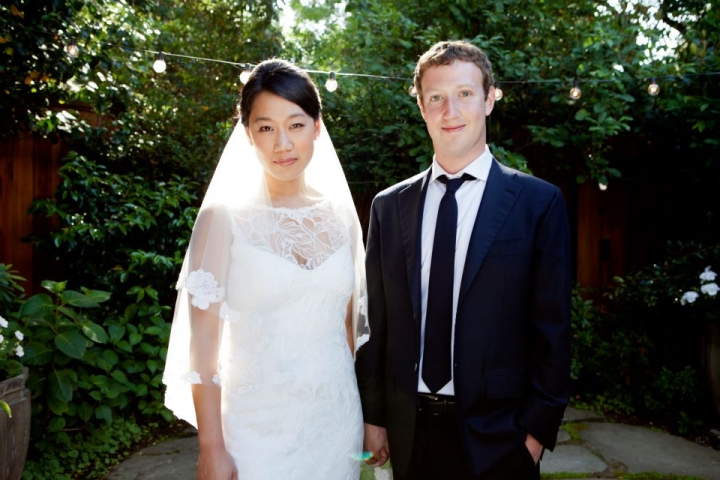 CEO Mark Zuckerberg promises to give 99% of his Facebook shares to charity — eventually.
CEO Mark Zuckerberg promises to give 99% of his Facebook shares to charity — eventually.
Exact phrasing: the stock, currently worth $45 billion, will be donated “during [he and his wife’s] lives.” He’s 31 and she’s 30, so actuarial tables being what they are, by approximately the year 2065.
If Facebook or the Internet or the earth still exist.
Whoop de doo.
I would be far more impressed if Facebook would put some money into the American economy. How? By hiring more workers — a lot more workers. Facebook’s market cap is $300 billion — almost ten times more than GM. GM has 216,000 employees. I’m not sure Facebook could find work for 2 million workers — but 12,000 is pathetic. They might start by hiring a few thousand 24-7 customer service reps so they could respond quickly when some antisocial pig posts your nude photo.
The part of the “ain’t Zuck nice” philanthropist suck-uppery that really has me annoyed is the “charity” bit.
Disclosure: I’m on record as being not at all into charity. If something is important enough to require funding — helping hurricane victims, sending doctors to war zones, poetry — it ought to be paid for by society as a whole, out of our taxes. We shouldn’t allow billionaires to aggregate enough wealth to billionaires in the first place. Partly, this is because it’s unfair. No one can work hard enough to earn one billion dollars. Also because it gives too much control to individuals at the expense of the 99.99% of everyone else.
Unfortunately, we await the revolution. So we still have billionaires running around pretending to be nice (as opposed to where they belong, hanging from a lamppost).
Even by our current dismal standards, however, Zuck is full of crap.
Point one: the Chan Zuckerberg Initiative is not a charity. It’s a limited liability corporation (LLC) that, like any other company, can donate to actual charities but can also invest in for-profit companies.
Point two: this is all about control.
A donation to an independent, classic 501(c) charity can come with strings attached — the money is only for a children’s wing of the hospital, no adults — but it’s ultimately spent by the charity based on its directors’ decisions. Under the LLC structure Zuckerberg will maintain nearly dictatorial control over the funds he’s “donating” to “charity.”
It’s the difference between you giving a hundred bucks to the United Way, and taking a hundred bucks out of your wallet and dropping into a coffee can in your kitchen. Maybe the C-spot in the coffee can will go to the poor. Maybe not. It certainly isn’t accurate to claim you gave it to charity.
If Zuck wants a “gives 99% of his stock to charity” headline, he ought to earn it — by giving 99% of his stock to actual charities. Charities that aren’t named after him. Charities he doesn’t control.
“Zuckerberg To Maybe Eventually Do Things He Deems Good With Some Of His Fortune” would be more accurate.
The vagueness of the Zuckerbergs’ announcement highlights how little anyone should be impressed. “Our initial areas of focus will be personalized learning, curing disease, connecting people and building strong communities,” they said.
Sound familiar?
The Bill and Melinda Gates Foundation was founded in 2000 with billions of dollars Microsoft extracted from American consumers via price gouging and gangster-style monopolistic tactics so ugly the feds almost broke up the company. The charity’s (it’s charted as a 501(c)) mission sounds remarkably similar to those of the Chan Zuckerberg Initiative: “Our foundation is teaming up with partners around the world to take on some tough challenges: extreme poverty and poor health in developing countries, and the failures of America’s education system.”
Which, right out of the gate, meant donating PCs to schools so that fewer kids would grow up using Macs.
If you’re a conservative who thinks government can’t do anything right, let me show you a charity that’s worse. The Gates Foundation wants to destroy teachers’ unions to take away their benefits and drive down their wages — hardly a way to attract the best and brightest young college graduates into the profession. And it has poured millions into the disastrous Common Core, which has created today’s “teach to the test” culture in public schools. Given Zuckerberg’s previous involvement in public schools, a $100 million fiasco in Newark, New Jersey that declared war on teachers, fetishized standardized testing and led to so many school closures that kids wound up walking miles through gang territory to new schools chosen for them by, really, an algorithm — it isn’t a stretch to guess that Chan Zuckerberg will look a lot like Bill and Melinda Gates.
I wouldn’t expect much — much good, anyway — from Zuckerberg on the poverty front, either. After all, Facebook is spreading poverty among American STEM workers by pushing Congress for more H1C visas for foreign workers hired by big tech companies to replace better-paid Americans. Odds are that, here too, the Chan Zuckerberg Initiative’s approach will be similar to the Gateses.
Too young and too rich to have a clue — and the only people they know are over-privileged corporate pigs. How do you think this will turn out?
In 2010, for example, Bill and Melinda drew fire for subsidizing African projects by agribusiness conglomerates Cargill and Monsanto, both notorious for crushing small farmers, to the tune of $23 million. They’re way into sketchy genetically-modified foods. They wind up propping up authoritarian and dictatorial political regimes by focusing on technocratic short-term “quick fix” projects that don’t address the underlying causes of poverty (psst — capitalism). It’s a safe bet Zuck’s anti-poverty stuff will make more people poorer.
It’s Zuckerberg’s billions. He can do what he wants with his money. But let’s not make the mistake of calling him a charitable giver, much less a great guy.
(Ted Rall, syndicated writer and the cartoonist for ANewDomain.net, is the author of the new book “Snowden,” the biography of the NSA whistleblower. Want to support independent journalism? You can subscribe to Ted Rall at Beacon.)
COPYRIGHT 2015 TED RALL, DISTRIBUTED BY CREATORS.COM
On Prioritizing Content: The Facebook Disconnect
Originally published at ANewDomain:
Facebook has announced it will prioritize content from your friends. “Content posted by the friends you care about” will be “higher up in the News Feed,” says the social media monolith. Something is wrong with this picture.
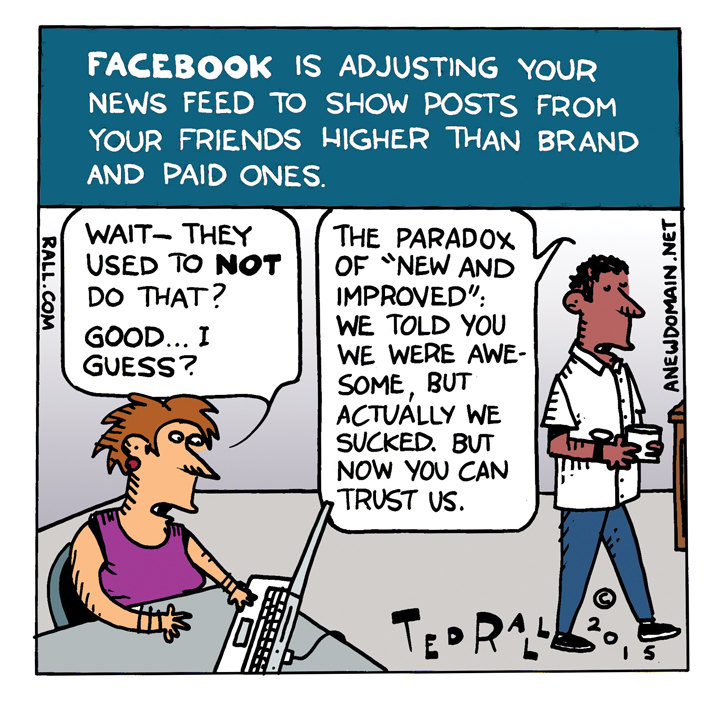
ANewDomain.net Essay: Don’t Hire Anyone Over 30: Ageism in Silicon Valley
Originally published at ANewDomain.net:
Most people know that Silicon Valley has a diversity problem. Women and ethnic minorities are underrepresented in Big Tech. Racist and sexist job discrimination are obviously unfair. They also shape a toxic, insular white male “bro” culture that generates periodic frat-boy eruptions (see, for example, the recent wine-fueled rant of an Uber executive who mused — to journalists — that he’d like to pay journalists to dig up dirt on journalists who criticize Uber. What could go wrong?)
After years of criticism, tech executives are finally starting to pay attention — and some are promising to recruit more women, blacks and Latinos.
This is progress, but it still leaves Silicon Valley with its biggest dirty secret: rampant, brazen age discrimination.
“Walk into any hot tech company and you’ll find disproportionate representation of young Caucasian and Asian males,” University of Washington computer scientist Ed Lazowska told The San Francisco Chronicle. “All forms of diversity are important, for the same reasons: workforce demand, equality of opportunity and quality of end product.”
Overt bigotry against older workers — we’re talking about anyone over 30 here — has been baked into the Valley’s infantile attitudes since the dot-com crash 14 years ago.
Life may begin at 50 elsewhere, but in the tech biz the only thing certain about middle age is unemployment.
The tone is set by the industry’s top CEOs. “When Mark Zuckerberg was 22, he said five words that might haunt him forever. ‘Younger people are just smarter,’ the Facebook wunderkind told his audience at a Y Combinator event at Stanford University in 2007. If the merits of youth were celebrated in Silicon Valley at the time, they have become even more enshrined since,” Alison Griswold writes in Slate.
It’s illegal, under the federal Age Discrimination in Employment Act of 1967, to pass up a potential employee for hire, or to fail to promote, or to fire a worker, for being too old. But don’t bother telling that to a tech executive. What used to be a meritocracy has become a don’t-hire-anyone-over-30 (certainly not over 40) — right under the nose of the tech media.
Which isn’t surprising. The supposed watchdogs of the Fourth Estate are wearing the same blinders as their supposed prey. The staffs of news sites like Valleywag and Techcrunch skew as young as the companies they cover.
A 2013 BuzzFeed piece titled ” What It’s Like Being The Oldest BuzzFeed Employee” (subhead: “I am so, so lost, every workday.”) by a 53-year-old BuzzFeed editor “old enough to be the father of nearly every other editorial employee” (average age: late 20s) reads like a repentant landlord-class sandwich-board confession during China’s Cultural Revolution: “These whiz-kids completely baffle me, daily. I am in a constant state of bafflement at BF HQ. In fact, I’ve never been more confused, day-in and day-out, in my life.” It’s the most pathetic attempt at self-deprecation I’ve read since the transcripts of Stalin’s show trials.
A few months later, the dude got fired by his boss (15 years younger): “This is just not working out, your stuff. Let’s just say, it’s ‘creative differences.’”
Big companies are on notice that they’re on the wrong side of employment law. They just don’t care.
Slate reports: “In 2011, Google reached a multimillion-dollar settlement in a…suit with computer scientist Brian Reid, who was fired from the company in 2004 at age 54. Reid claimed that Google employees made derogatory comments about his age, telling him he was ‘obsolete,’ ‘sluggish,’ and an ‘old fuddy-duddy’ whose ideas were ‘too old to matter.’ Other companies—including Apple, Facebook, and Yahoo—have gotten themselves in hot water by posting job listings with ‘new grad‘ in the description. In 2013, Facebook settled a case with California’s Fair Employment and Housing Department over a job listing for an attorney that noted ‘Class of 2007 or 2008 preferred.’”
Because the fines and settlements have been mere slaps on the wrist, the cult of the Youth Bro is still going strong.
To walk the streets of Austin during tech’s biggest annual confab, South by Southwest Interactive, is to experience a society where Boomers and Gen Xers have vanished into a black hole. Photos of those open-space offices favored by start-ups document workplaces where people over 35 are as scarce as women on the streets of Kandahar. From Menlo Park to Palo Alto, token fortysomethings wear the nervous shrew-like expressions of creatures in constant danger of getting eaten — dressed a little too young, heads down, no eye contact, hoping not to be noticed.
“Silicon Valley has become one of the most ageist places in America,” Noam Scheiber reported in a New Republic feature that describes tech workers as young as 26 seeking plastic surgery in order to stave off the early signs of male pattern baldness and minor skin splotches on their faces.
Whatever you do, don’t look your age — unless your age is 22.
“Robert Withers, a counselor who helps Silicon Valley workers over 40 with their job searches, told me he recommends that older applicants have a professional snap the photo they post on their LinkedIn page to ensure that it exudes energy and vigor, not fatigue,” Scheiber writes. “He also advises them to spend time in the parking lot of a company where they will be interviewing so they can scope out how people dress.”
The head of the most prominent start-up incubator told The New York Times that most venture capitalists in the Valley won’t take a pitch from anyone over 32.
In early November, VCs handed over several hundred thousand bucks to a 13-year-old.
Aside from the legal and ethical considerations, does Big Tech’s cult of youth matter? Scheiber says hell yes: “In the one corner of the American economy defined by its relentless optimism, where the spirit of invention and reinvention reigns supreme, we now have a large and growing class of highly trained, objectively talented, surpassingly ambitious workers who are shunted to the margins, doomed to haunt corporate parking lots and medical waiting rooms, for reasons no one can rationally explain. The consequences are downright depressing.”
One result of ageism that jumps to the top of my mind is brain drain. Youthful vigor is vital to success in business. So is seasoned experience. The closer an organization reflects society at large, the smarter it is.
A female colleague recently called to inform me that she was about to get laid off from her job as an editor and writer for a major tech news site. (She was, of course, the oldest employee at the company.) Naturally caffeinated, addicted to the Internet and pop culture, she’s usually the smartest person in the room. I see lots of tech journalism openings for which she’d be a perfect fit, yet she’s at her wit’s end. “I’m going to jump off a bridge,” she threatened. “What else can I do? I’m 45. No one’s ever going to hire me.” Though I urged her not to take the plunge, I couldn’t argue with her pessimism. Objectively, though, I think the employers who won’t talk to her are idiots. For their own sakes.
Just a month before, I’d met with an executive of a major tech news site who told me I wouldn’t be considered for a position due to my age. “Aside from being stupid,” I replied, “you do know that’s illegal, right?”
“No one enforces it,” he shrugged. He’s right. The feds don’t even keep national statistics on hiring by age.
The median American worker is age 42. The median age at Facebook, Google, AOL and Zynga, on the other hand, is 30 or younger. Twitter, which recently got hosed in an age discrimination lawsuit, has a median age of 28.
Big Tech doesn’t want you to know they don’t hire middle-aged Americans. Age data was intentionally omitted from the recent spate of “we can do better” mea culpa reports on company diversity.
It’s easy to suss out why: they prefer to hire cheaper, more disposable, more flexible (willing to work longer hours) younger workers. Apple and Facebook recently made news by offering to freeze its female workers’ eggs so they can delay parenthood in order to devote their 20s and 30s to the company.
The dirty secret is not so secret when you scour online want ads. “Many tech companies post openings exclusively for new or recent college graduates, a pool of candidates that is overwhelmingly in its early twenties,” Verne Kopytoff writes in Fortune.
“It’s nothing short of rampant,” said UC David comp sci professor Norm Matloff, about age discrimination against older software developers. Adding to the grim irony for Gen Xers: today’s fortysomethings suffered reverse age discrimination — old people in power screwing the young — at the hands of Boomers in charge when they were entering the workforce.
Once too young to be trusted, now too old to get hired.
Ageist hiring practices are so over-the-top illegal, you have to wonder: do these jerks have in-house counsel?
Kopytoff: “Apple, Facebook, Yahoo, Dropbox, and video game maker Electronic Arts all recently listed openings with ‘new grad’ in the title. Some companies say that recent college graduates will also be considered and then go on to specify which graduating classes—2011 or 2012, for instance—are acceptable.”
The feds take a dim view of these ads.
“In our view, it’s illegal,” Raymond Peeler, senior attorney advisor at the Equal Employment Opportunity Commission, told Kopytoff. “We think it deters older applicants from applying.” Gee, you think? But the EEOC has yet to smack a tech company with a big fine.
The job market is supposed to eliminate efficiencies like this, where companies that need experienced reporters fire them while retaining writers who are so wet behind the ears you want to check for moss. But ageism is so ingrained into tech culture that it’s part of the scenery, a cultural signifier like choosing an iPhone over Android. Everyone takes it for granted.
Scheiber describes a file storage company’s annual Hack Week, which might as well be scientifically designed in order to make adults with kids and a mortgage run away screaming: “Dropbox headquarters turns into the world’s best-capitalized rumpus room. Employees ride around on skateboards and scooters, play with Legos at all hours, and generally tool around with whatever happens to interest them, other than work, which they are encouraged to set aside.”
No matter how cool a 55-year-old you are, you’re going to feel left out. Which, one suspects, is the point.
It’s impossible to overstate how ageist many tech outfits are.
Electronic Arts contacted Kopytoff to defend its “new grad” employment ads, only to confirm their bigotry. The company “defended its ads by saying that it hires people of all ages into its new grad program. To prove the point, the company said those accepted into the program range in age from 21 to 35. But the company soon had second thoughts about releasing such information, which shows a total absence of middle-aged hires in the grad program, and asked Fortune to withhold that detail from publication. (Fortune declined.)”
EA’s idea of age diversity is zero workers over 35.
Here is one case where an experienced, forty- or fifty- or even sixtysomething in-house lawyer or publicist might have saved them some embarrassment — and legal exposure.
In the big picture, Silicon Valley is hardly an engine of job growth; they haven’t added a single net new job since 1998. “Big” companies like Facebook and Twitter only hire a few thousand workers each. Instagram famously only had 13 when it went public. They have little interest in contributing to the commonweal. Nevertheless, tech ageism in the tiny tech sector has a disproportionately high influence on workplace practices in other workspaces. If it is allowed to continue, it will spread to other fields.
It’s hard to see how anything short of a massive class-action lawsuit — one that dings tech giants for billions of dollars — will make Big Tech hire Xers, much less Boomers.
ANewDomain.net Essay: Why It’s Time for Zuck to Back His NSA Criticisms with Cash
From my new essay, exclusively on ANewDomain.net, about Zuckerberg’s call to Obama asking him to ramp down NSA spying:
“The Internet is our shared space,” Zuckerberg wrote. “It helps us connect. It spreads opportunity. This is why I’ve been so confused and frustrated by the repeated reports of the behavior of the U.S. government. When our engineers work tirelessly to improve security, we imagine we’re protecting you against criminals, not our own government.”
Given that Facebook worked with the NSA to create “the tech equivalent of a safety deposit box that only the NSA and the corresponding tech company can access… (the equivalent of) … a locked briefcase full of intel left in a digital garbage can with the NSA swinging in to pick it up at a prescribed time,” Zuckerberg’s confusion is — what else? — confusing.
It’s as if he is shocked — shocked! — to find that crazy dystopian data-vacuuming of everything about everyone all the time is going on at his own company. Yet he engineered it, in part.
But here’s the part of Zuck’s doth-protest-buckets post I found especially intriguing. He writes:
So it’s up to us — all of us — to build the Internet we want. Together, we can build a space that is greater and a more important part of the world than anything we have today, but is also safe and secure.”
Can we? Can we really?
SYNDICATED COLUMN: Good Reasons to Hate Big Tech
We love computers and other electronics, but — not unlike an addict’s opinion of his dealer — we hate the companies that sell them to us. Now our contempt for Silicon Valley is expanding to include tech workers.
In San Francisco, where locals know the techies best, 30-year-old worker bees are taking as much heat as their billionaire CEO overlords.
Geographical familiarity breeds political contempt.
Just as Zuccotti Park gave birth to Occupy Wall Street’s clarion cry against the predator class henceforth to be known as the Banksters, San Francisco bus stops have become ground zero in a backlash against Big Tech. Oversized SUV-like buses that ferry Google staffers down the Peninsula provoke anger by clogging public transit stops in a city whose crumbling fleet of city vehicles is starved of funding. Private tech company buses have been blocked by protesters who object to gentrification fueled by the soaring rents paid by deep-pocked tech workers. A bus window got smashed. Across the bay in Berkeley, demonstrators even showed up at the home of a Google engineer to hold him to account for his dual role as tech dystopian (he runs Google’s creepy robot car project) and real estate developer.
Save for a window and a few Google worker tardy notices, nothing has been harmed. Days of Rage this ain’t.
Despite the relative mellowness of it all, any hint that American leftism is livelier than a withered corpse prompts establishmentarians into anxious fits that the streets will soon run red with the blood of fattened-on-organic-veal-and-green-smoothies technorati. In Salon, the usually steady Andrew Leonard lectured San Francisco’s dispossessed that street actions like slashing bus tires are “bullshit,” opining that “delivering passionate rhetoric at a public hearing on city policy toward private shuttles is part and parcel of how a democratic society operates.” (Or doesn’t operate, by his very own account.)
“This is a very dangerous drift in our American thinking,” Tom Perkins, an 82-year-old venture capitalist who helped fund the initial launch of Google, wrote in an instantly infamous letter to the The Wall Street Journal, comparing dislike of 1%ers to Nazi attacks on Jews. “Kristallnacht was unthinkable in 1930; is its descendant ‘progressive’ radicalism unthinkable now?” (Note to Perkins: You’re old enough to remember that Nazism was a right-wing movement.)
“With spokesmen like Mr. Perkins,” David Streitfeld responded in The New York Times, “the tech community will alienate the entire country in no time.”
Gallup’s 2011 poll of public perceptions found that Americans view the tech sector more positively than any other industry but that, I think, is not going to last. Because there are lots of good reasons to hate Big Tech.
The root of our contempt for the tech biz is that all our economic eggs are in their basket. Manufacturing is never coming back. Whatever chance the U.S. economy has of recovering from the 2008-09 collapse (and, for that matter, the 2000-01 and 1989-93 recessions) lies with the tech sector. But the technies don’t care. And they’re barely employing anyone.
Facebook has 6,300 employees, Twitter has 2000, Instagram has 13.
The Big Three auto companies each employ between 2.5 million and 3 million workers directly or through subsidiaries and contractors.
It’s not like Facebook couldn’t use more American workers. Because Mark Zuckerberg can never grab enough loot for himself, Facebook does without the basics, like customer service reps. They don’t even have a phone number.
It’s hard to feel warm and fuzzy about companies that don’t hire us, our neighbors or, well, anyone at all.
Or answer the phone.
Fair or not, we feel vested in tech. The average American spends thousands of dollars a year on electronics and tech-related services, including broadband Internet. Objectively, we spend more on housing, food and energy — but those expenditures feel impersonal. Unlike our devices, we’re not constantly reminded of them.
Smartphones, tablets and desktop computers are central to our minute-by-minute lives, serving as a constant reminder of our material support to the digerati.
Every time we pick up our iPhone, we recall the $400 we spent on it. (And the $300 on its once cool, now lame, two-year-old precursor.) This makes us think of historic, extravagant profits pocketed by their makers. We can’t help but remember the over-the-top paychecks collected by their makers’ CEOs, including the incompetent ones. Also popping to the front of our consciousness is the despicable outsourcing of manufacturing to slave labor contracting firms like Foxconn, where abused Chinese workers attempt suicide so often that the company had to install netting around dormitory windows. Charmingly, Foxconn began requiring new hires to sign an agreement releasing the company from liability if they kill themselves.
Few industries gouge consumers as ferociously as wildly profitable tech outfits like Microsoft, Adobe and Apple.
Not only have Americans been reamed by Big Tech — they know they’ve been reamed. Which sets the stage for big-time resentment.
In the past, wealthy companies and individuals mitigated populist resentment by paying homage to the social contract — i.e., by giving back. Henry Ford paid assembly line workers more than market rates because he wanted them to be able to afford his cars. 19th century robber barons like J.P. Morgan and Cornelius Vanderbilt built museums and contributed to colleges and civic organizations. These gestures helped keep socialism at bay.
Whether it’s due to the influence of technolibertarianism, pure greed or obliviousness, tech titans are relative skinflints compared to the manufacturing giants they’ve supplanted. Yes, there’s the Bill and Melinda Gates Foundation (though its “philanthrocapitalism” model is staggeringly ineffective). But Steve Jobs kept almost every cent. Facebook and Twitter are basically “non-players” in the philanthropy world. Google doles out roughly 0.02% of its annual profits in charitable grants.
Some say the techies aren’t cheap — just skittish. “A lot of the wealthy in Silicon Valley are newly wealthy,” said E. Chris Wilder, executive director of the Valley Medical Center Foundation in San Jose. “That money still feels a little too tenuous; still feels fleeting. And the economic downturn has reinforced that feeling.”
Whatever the cause, underemployed and overcharged Americans expect tech’s 1% to start stepping up.
(Support independent journalism and political commentary. Subscribe to Ted Rall at Beacon.)
COPYRIGHT 2014 TED RALL, DISTRIBUTED BY CREATORS.COM

